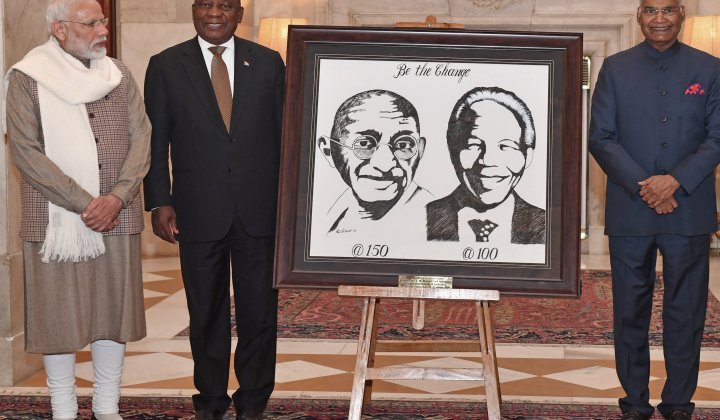Trust levels seem to be at an all-time low, both in South Africa and globally. This is bad news because, in the end, trust is what holds societies and economies together. One could argue that capitalism itself is facing a crisis of legitimacy owing to a string of corporate scandals and a perceived pursuit of profit at the expense of all else.
Corruption, too, is eroding trust in the state, particularly in this country.
As has often been observed, ethical behaviour and practices are among the surest ways of rebuilding trust. For that reason, ethics plays a key role in the King IV Report on Corporate Governance. Their first two principles are that the governing body should lead ethically and effectively and that the governing body should govern the ethics of the organisation to support the establishment of an ethical culture.
Of course, the difficulty is that while crucially important, ethics are not easily managed or governed. In that sense, they resemble corporate culture, another critically important success lever that is difficult to operate.
It’s this conundrum that the Ethics Barometer essentially came into being to solve. The idea is to provide organisations with a way to measure, and therefore assist in managing, the way their conduct is perceived. While perceptions do not necessarily indicate objective reality, they are nevertheless important. They provide data that can be used to prompt a deeper engagement with stakeholders and a process of self-reflection.
Indeed, as the data accumulates, one presumes it could become possible to compare improvements in ethical performance with performance in other areas, finance, market perception, customer retention and so on.
Firstly, it was necessary to come up with a model. Rabbi Gideon Pogrund, director of the GIBS Ethics Think Tank, together with his team, decided to use the Global Business Standards Codex developed by Professors Rohit Deshpandé, Lynn S. Paine, and Joshua D. Margolis at Harvard Business School. The model was based on extensive research into globally recognised conduct principles1 and was followed by a global survey of what employees actually felt about their employers’ conduct.2
The Ethics Think Tank hosted Professor Paine as its first Scholar-in-Residence in 2016. After that, the GIBS Ethics Think Tank agreed with Harvard Business School to use the Codex. But, Rabbi Pogrund says, the Harvard model was only the beginning – it was obviously important to ensure that it was locally relevant. “We worked very hard to come up with something that was locally relevant and addressed specific South African challenges while remaining aligned with the global framework. It was a balancing act.” The resulting model, the Ethics Barometer, emphasised transformation and righting historical wrongs.
At the end of this process, Pogrund and fellow GIBS faculty, Marius Oosthuizen, who worked closely with him in this project, went to Harvard Business School to share the methodology and findings of the GIBS Ethics Barometer.
To date, GIBS is the only business school to have taken this course, creating a unique partnership to apply global research and insights to the local scene and thus contribute to the development of a global body of empirical data relating to ethics in business.
A notable feature of this project was that GIBS itself formed part of the group of organisations that took part in the pilot project – this was something that the Dean at the time, Prof. Nicola Kleyn, insisted on.
The pilot project surveyed over 8,000 employees at 15 leading South African companies across various sectors, including banking, insurance, financial services, mining, property, retail, leisure and professional services. It set out to discover what these employees’ perceptions were of their own organisations’ ethics. The results were aggregated and anonymised to create a national benchmark, with participating companies receiving their scores (also anonymised, obviously). This meant that companies could see their performance and compare it against their peers. Companies will also be able to track progress as the survey is repeated.
An important partnership
The Ethics Barometer initiative is partnering with Business Leadership South Africa (BLSA). Like the association with Harvard Business School, it gives gravitas to the initiative. It aligns well with BLSA’s key objectives as laid out in its contract with South Africa and its integrity pledge. It’s also in line with GIBS’ trademark approach of combining academic rigour to deliver practical benefits to business.
“In 2016, BLSA decided to initiate a fresh approach to state capture and corruption, recognising that big business had played a key facilitating role in both. We committed our members to a more ethical approach through a commitment to the integrity pledge, which is part of the BLSA constitution. We see the Ethics Barometer as a great way to encourage our members to make ethics more tangible in their organisations,” says Nyeleti Magadze, executive: strategy, BLSA. “Giving our members a tool to assess their own behaviour is powerful and will help move companies away from a compliance approach.”
Pogrund says the further iterations of the Ethics Barometer will aim to expand the number of companies taking part and survey the perceptions of external stakeholders such as customers and business partners, creating a 360°perspective that will, according to Magadze, enormously increase the value to business. Sectoral surveys covering SMMEs and the accounting profession are already underway.
The Ethics Barometer will ultimately be judged on how useful leaders find its insights and recommendations, and whether they act on them. If that occurs, it could play a role in making capitalism more inclusive and sustainable and setting an example for state-owned enterprises to emulate.
Standout insights from the pilot Ethics Barometer
- In line with the HBS study, South African employees assign high levels of importance to ethics.
- Overall, employees felt that their organisations engaged fairly with external stakeholders but had less favourable perceptions about how they were treated.
- While 45% of respondents reported witnessing at least one of 18 types of misconduct over the past 24 months, only 30% of that group had reported it. The top reasons for not reporting misconduct were fear of victimisation and the belief that no action would be taken.
- There is a perceived lack of diversity and inclusion, with African blacks more likely to have a less favourable view than white colleagues.
- Some 76% of respondents agreed that their organisations were correcting historical wrongs out of genuine commitment, but employees of colour, particularly black African employees, had less favourable perceptions.
- On the whole, employees felt that their organisations played a positive role in society.
- Two of the least favourably perceived organisational behaviours related to leadership were how well leaders live up to the company’s values and standards, and perceptions of managers telling the truth to employees.
Click here to view the report of the findings from the first phase of the Ethics Barometer.
1 See Lynn S. Paine , Rohit Deshpandé , Joshua D. Margolis and Kim Eric Bettcher, “Up to Code: Does Your Company’s Conduct Meet World-Class Standards?”, Harvard Business Review (December 2005), available at https://hbr.org/2005/12/up-to-code-does-your-companys-conduct-meet-world-class-standards; also Carmen Nobel, “Creating a global business code”, Harvard Business School Working Knowledge (14 November 2011), available at https://hbswk.hbs.edu/item/creating-a-global-business-code
2 Lynn S. Paine , Rohit Deshpandé , Joshua D. Margolis, “A global leader’s guide to managing business conduct” (September 2011), available at https://hbr.org/2011/09/a-global-leaders-guide-to-managing-business-conduct




